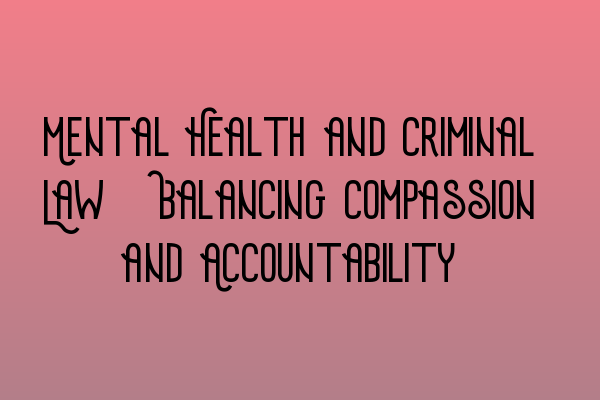Mental Health and Criminal Law: Balancing Compassion and Accountability
In recent years, there has been an increased awareness and recognition of the importance of mental health in society. The field of criminal law is no exception, as it grapples with the complex issue of how to balance compassion for individuals with mental health issues and the need for accountability for criminal acts.
At SQE Criminal Law & Practice Law UK, we understand the significance of this topic and the impact it has on both the individuals involved and the criminal justice system as a whole. In this article, we will explore the various aspects of mental health and criminal law, highlighting the challenges and potential solutions.
The Link between Mental Health and Criminal Behavior
Research has consistently shown that there is a strong link between mental health issues and criminal behavior. Individuals with untreated or poorly managed mental health conditions are more likely to engage in criminal activities due to a combination of factors such as impaired judgment, impulsivity, and a lack of access to appropriate support and treatment.
Recognizing this connection, it is crucial for the criminal justice system to take mental health into account when assessing responsibility and determining appropriate interventions. This involves assessing the individual’s mental state at the time of the offense, considering any underlying mental health conditions, and evaluating the impact of these factors on their capacity to understand the nature and consequences of their actions.
Legal Framework and Mental Health
The legal framework surrounding mental health and criminal law varies across jurisdictions. In the UK, the Mental Health Act 1983 provides guidelines for dealing with individuals with mental health disorders who come into contact with the criminal justice system. It allows for diversion from prosecution, compulsory treatment, and the consideration of alternative sentences and interventions.
However, despite these provisions, there are still challenges in effectively integrating mental health considerations into criminal proceedings. Limited resources, a lack of understanding and awareness among criminal justice professionals, and the stigma associated with mental health issues can all hinder the proper identification and support of individuals with mental health conditions.
Key Considerations for a Balanced Approach
When addressing the intersection of mental health and criminal law, it is essential to strike a balance between compassion and accountability. Here are some key considerations:
1. Early Intervention and Support:
By identifying mental health issues early on and providing appropriate support and treatment, it is possible to address the underlying causes of criminal behavior and reduce the likelihood of future offenses. This requires collaboration between the criminal justice system, mental health professionals, and community support services.
2. Diversion Programs:
Diversion programs offer an alternative to traditional prosecution, focusing on rehabilitation rather than punishment. These programs provide individuals with mental health issues the necessary support and treatment while holding them accountable for their actions. By addressing the root causes of criminal behavior, diversion programs aim to break the cycle of reoffending.
3. Training and Education:
Providing training and education to legal professionals and law enforcement officers is crucial in improving the understanding and effective handling of mental health issues within the criminal justice system. This includes raising awareness of mental health conditions, recognizing signs of distress, and utilizing appropriate assessment tools.
The Way Forward
As our society continues to evolve and place greater emphasis on mental health, it is imperative for the criminal justice system to adapt and respond accordingly. By integrating compassionate and evidence-based approaches, we can effectively address the underlying causes of criminal behavior while ensuring accountability.
At SQE Criminal Law & Practice Law UK, we believe in fostering a comprehensive understanding of mental health and criminal law. If you would like to explore this topic further, we invite you to check out our related articles:
- Demystifying the Solicitors Qualifying Examination Format
- LLC Formation Made Simple: Step-by-Step Guide for UK Entrepreneurs
- Business Regulations in the UK: A Comprehensive Overview
- Preparing for the SQE Exam: Strategies and Resources for Success
- SQE Workshops and Webinars: Accelerate Your Exam Preparation
Thank you for taking the time to explore the topic of mental health and criminal law with us. We hope this article has provided valuable insights into the challenges and potential solutions in balancing compassion and accountability within the criminal justice system.
